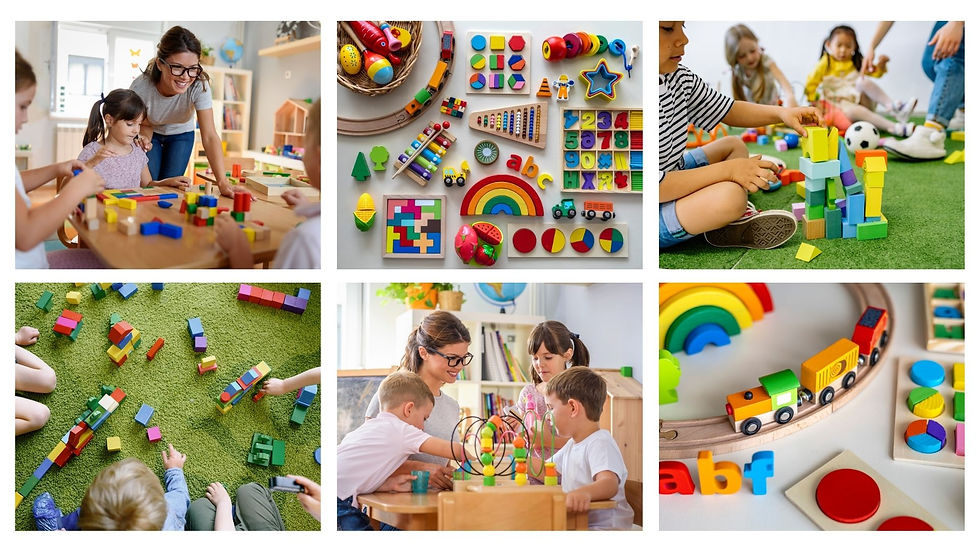Is Playschool Really Necessary? Here’s What the Experts Say
- Ducky's Play and Development Centre

- Aug 19, 2025
- 4 min read
Updated: Aug 27, 2025
If you’re a parent of a toddler, chances are you’ve been asked (or asked yourself):
“Should I send my child to a playschool… or can we just stick to playground adventures, couch forts, and the occasional Play-Doh explosion in the living room?”
Well, before you pack that mini backpack or decide to hold off, let’s unpack what playschool is really about — and why experts (and a lot of happy kids) say it’s more than just “glorified babysitting.”
First, what is a playschool, exactly?
Playschool is like a gentle on-ramp to the world of learning. It’s not about acing math tests before the age of three (please, no) — it’s about exploring, socializing, and learning through play.
Think of it as the space between home life and the big-school grind — a place where curiosity is the curriculum and play is the teacher.
What the experts say
According to the Early Years Learning Framework (EYLF), early childhood education is all about belonging, being, and becoming.
That means:
Belonging: Kids feel safe, seen, and part of a little community.
Being: They get to enjoy the moment (mud pies, finger paint, building block towers — all valid life choices).
Becoming: They’re slowly developing the skills they’ll use for a lifetime, like problem-solving, empathy, and self-confidence.
Experts in child development agree — structured play in a nurturing environment helps children develop social skills, fine and gross motor skills, early literacy, and emotional resilience. And yes, it can also mean they’re less likely to melt down over sharing a crayon.
Associate Professor Jane Torr, one of the brilliant minds behind Australia’s very first Early Years Learning Framework (EYLF), shares why the framework matters so much:
She helped write the EYLF to “assist educators to provide young children with opportunities to maximise their potential and develop a foundation for future success in learning.”
In other words, the EYLF isn’t about fast-tracking kids into mini mathematicians or pint-sized professors. It’s about giving them the richest, sturdiest foundation possible — socially, emotionally, physically, and yes, cognitively — so they can thrive not just in their first year of school, but in every adventure life throws at them. It’s the difference between teaching a child how to memorise and helping them learn how to learn.
Think of it as building a house: if the foundations are solid, you can weather any storm. And for children, those foundations are formed through play, curiosity, relationships, and the space to explore the world at their own pace. EYLF understands that “school readiness” isn’t just knowing your ABCs; it’s being able to problem-solve, adapt, share, communicate, and confidently take on new challenges.
Because at the end of the day, childhood isn’t a race — it’s a season. And the EYLF makes sure kids get to enjoy that season while quietly equipping them for everything that comes next.

“But my child already plays at home!”
Absolutely — and that’s wonderful! Home play is precious and irreplaceable. But playschool adds a few extra layers:
Peer learning: Your child learns from other kids their age — how to share, negotiate, and sometimes (adorably) mispronounce each other’s names.
Routine and structure: Not rigid schedules, but gentle rhythms that prepare them for future school life.
Exposure to new activities: From music and movement to sensory play, they get experiences that might be tricky to replicate at home (unless you own a small petting zoo and a full art studio).
Independence: You’d be amazed at how quickly they learn to hang up their own bag or pour their own water.
It’s not about “pushing academics”
Here’s the thing — playschool done right (like at Ducky’s Play and Development Centre) isn’t about drilling the alphabet or turning three-year-olds into mini Einsteins.
It’s about letting them be kids while giving them a safe, stimulating environment where they can learn naturally. Because guess what? Counting the apples in their snack bowl is math. Pretending to be a shopkeeper is literacy. Playing with building blocks is science and engineering.
Samantha Page, CEO of Early Childhood Australia, couldn’t have said it better when she described the magic of play:
“Play-based learning is the way children make sense of the world and develop language, cognition, fine and gross motor skills, as well as social and emotional skills.”
And it’s not just letting kids “play” — she adds:
“Trained early childhood educators support and extend play to maximise learning through exploration, inquiry and problem-solving.”
(Source: First Five Years)
It’s this kind of intentional, guided play that helps children grow in ways worksheets simply can’t.
When playschool shines the brightest
Playschool can be especially helpful if your child:
Is eager to play with other kids but doesn’t get many opportunities
Thrives on new experiences and activities
Could benefit from a little more structure in their day
Is transitioning towards kindergarten and needs a soft start

The bottom line
Is playschool necessary? For some kids, absolutely — it’s a launchpad to confidence, friendship, and a lifelong love of learning. For others, it’s an enriching addition to the amazing things they’re already doing at home.
The real goal isn’t to rush childhood, but to nurture it. Because these early years? They only happen once.
So whether your little one is learning to count ladybugs in the garden or singing the “Clean Up” song with new friends at playschool, they’re already doing the most important work there is — growing up happy, curious, and loved.
At Ducky’s, we believe in purposeful play, gentle guidance, and celebrating childhood — exactly as it’s meant to be.



.png)
Comments